![]()
William Murray
William (known in the family as Bill) Murray was the second child and elder son of Abijah and Grace Murray. He had an older sister, Margaret Campbell Murray (my grand-mother), and a younger brother, Robert McDiarmid Murray. He was born on 5 April 1892 in Meadow Place, Marchmont, Edinburgh. Meadow Place is now a listed area, and although the family home still stands, it is overshadowed by a large concrete block of apartments.
Among our family "treasures" is a sampler stitched by Bill Murray in 1900 - when he'd have been about 8 years old. It gives the address "St Andrew's Cottage".
EDUCATION AND TRAINING
Bill was educated at George Watson's College in Edinburgh. In a letter dated 19 July 1903 Bill's father, Abijah Murray, writes to a relative saying that his children have just received the results of their school marks and exams and that all three have done very well. Of Bill's achievements he writes: "Willie gets 4th prize in English and 4 certificates." This isn't quite as good as his older sister, Margaret who was "second in her class in English and she gets 8 certificates". In the same letter we learn that "Willie has a cold and a nasty cough". Abijah blames his "manouevres at the baths" for his illness - and seems to think he stays in the water far too long.
While at George Watson's Bill became a cadet - there's a good photo taken of him in his uniform in 1906 when he'd have been about 14 years old.
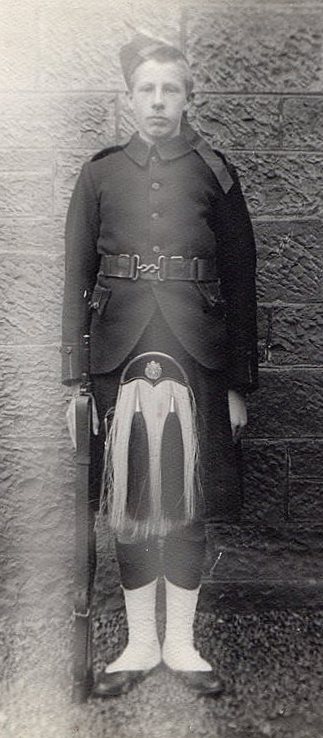
Between leaving school in ca 1910 and becoming an apprentice in 1911, Bill spent a year in Germany at University in Marburg an der Lahn in Hessen, studying History (the Napoleonic Wars) and Volkswirtschaft (= good house-keeping) at all levels. This had been arranged by his Minister, who had formerly studied there himself, and Bill quickly immersed himself in learning German at first hand. One of his sources of learning was poetry, which he'd learn and then recite by memory. Even towards the end of his life he was still able to recite spontaneously in flawless German portions of Goethe and Schiller as well as children's nursery rhymes. This fluency was also recognised as a valuable asset when he served with the Allied Control Commissions in Berlin at the end of both World Wars.
On 9 October 1911 Bill was indentured as an apprentice to the accountancy firm of John Wilson and George Kirkwood Johnston for a period of 5 years. His starting salary was £10 a year, rising by £5 annually to £30. The indenture was due to expire on 8 October 1916, but the First World War intervened to disrupt his training and his final discharge from the company wasn't signed until 3 November 1919. The discharge includes the following: "We hereby declare that Bill Murray served with his Majesty's Forces from 5 August 1914 until 4 June 1919 and that in accordance with the Resolution passed by the Society of Accountants in Edinburgh on 16 September 1917 two years of this time has been counted as time served under the within indenture."
Early in 1912 Bill's father, Abijah Murray, died. Bill was only 19 years old. He recalled how his father died during the night when he, Bill, was sitting by his bedside. It was a great loss to the family. Uncle Bill was an apprentice, his brother Robert was at University, and his sister Margaret was just finishing art school, taking her qualification in design.
Bill undertook his advanced accounting studies at the Heriot Watt University as there was no provision for accounting training at Edinburgh University prior to the First World War, apart from the legal side of trusts, trust accounting and accounts of charge and discharge.
When he was "disembodied" from the army in 1919 he had to complete 3 years service in a firm of chartered accountants. By now he was 27 years old and was paid £50 a year less national health insurance.
MILITARY SERVICE - WORLD WAR I
Bill served as a Private with the 1/4th Royal Scots (Queen's Edinburgh Rifles) Territorial Volunteers during the First World War. This was the Regiment which had the audacity to wear black buttons on their tunics because they were always placed in the front line of any action.
Bill put in 14 days camp at Stow in July 1914 and was mobilised on 4 August 1914. He served in both Gallipoli and France, and sad memories of the former ill-fated campaign plus the loss of his brother killed in action in France left a distressful and disturbing pain in his mind throughout his long life. Christmas 1918 was spent in Rouen, France.
On 27 January 1919 H. Ruggles Brise, the Field Marshall Commanding in Chief of the British Armies in France wrote to the Secretary at the War Office in London as follows:
"Sir, With reference to War Office letter No 49/Artificers/1965 (AG4A) of the 31st October 1915, I have the honour to inform you that, under the powers therein delegated to me by the Army Council, I have promoted the undernamed Sergeant (Orderly Room Sergeant) to the rank of Colour Sergeant (ORS), with effect from 26 January 1919, inclusive, in recognition of the distinguished services they have rendered during the present campaign.
No 200179, Sergeant (ORS) W Murray, 1/4th Battn Royal Scots."
He was "disembodied" on 4 June 1919. (All Territorial Force units were disembodied during demobilisation; they were then reconstituted in 1920 as the part-time Territorial Army.)
PROFESSIONAL CAREER
When he went up to London to his first job after qualifying as a Scots CA (Chartered Accountant) he shared a bed-sitting room with Harry Rule (who came from the family that owned Rules Restaurant) at Kenilworth Court, overlooking the Thames at Putney Bridge. Bill and Harry used to get up early and get a boat apiece at the Thames Boat Club and practice skulling on the river. They also watched the start of the 1920 Boat Race from their window on 27 March. Racing had been suspended during the First World War, so this would have been the first year of its reprieve. It was the 72nd official race and was won by Cambridge by 4 lengths in a time of 21 minutes 11 seconds.
Bill and Harry had passed their CA finals in December 1919 and both started work in London at the Ministry of Food's Costing HQ at Palace Chambers, close to Big Ben. The office they shared overlooked New Scotland Yard, but apparently they were away a good deal. Both men worked in the Costing Inspectorate, Harry Rule on Fishery costs, Uncle Bill on Bacon and Bread and Butter and Diary Produce Costing and Costs Complaints.
Apparently the first Ministry of Food was formed on 22 December 1916. It was empowered under the New Ministries and Secretaries Act 1916 to regulate food supply and consumption and it also took steps to encourage food production. As its functions were depleted the Ministry was dissolved on 31 March 1921 and the few remaining duties were divided between the Ministry of Agriculture and Fisheries and the Board of Trade.
Presumably it is the gradual depletion of functions that explains why Uncle Bill didn't remain long with the Ministry of Food, though he took the view that his work there gave him good experience of "troubleshooting". At the end of 1920 he was transferred from the Ministry of Food to the Reparation Commission in Paris at the beginning of December and from Paris to Berlin on around 15 December and so was in Berlin for Christmas. There is a passport photo taken of him in Berlin dated 1921/2 so it's likely that he stayed there for a couple of years or so.
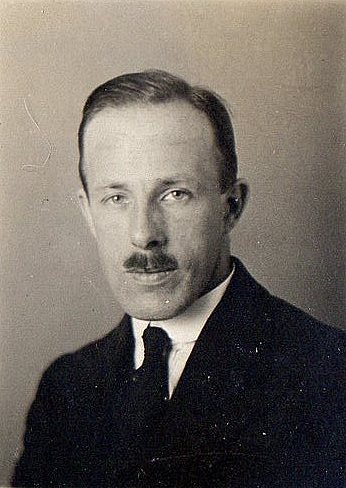
He seems to have been lucky in getting interesting jobs that took him round the world and involved him in a certain amount of "trouble-shooting". He first went to Japan in 1924, the year after the Great Kanto Earthquake (1 September 1923) which destroyed close to 80% of Yokohama, including the Government's offices, along with their records. His job was to help tidying up the mess. He sailed to Kobe in November 1924 on the P & O ship SS Kalyan (9,000 tons, 9,000 horse-power) via Suez, Colombo, Singapore, Hong Kong, Shanghai and Shimonoseki. He recorded that there were 5 in his cabin to Singapore.
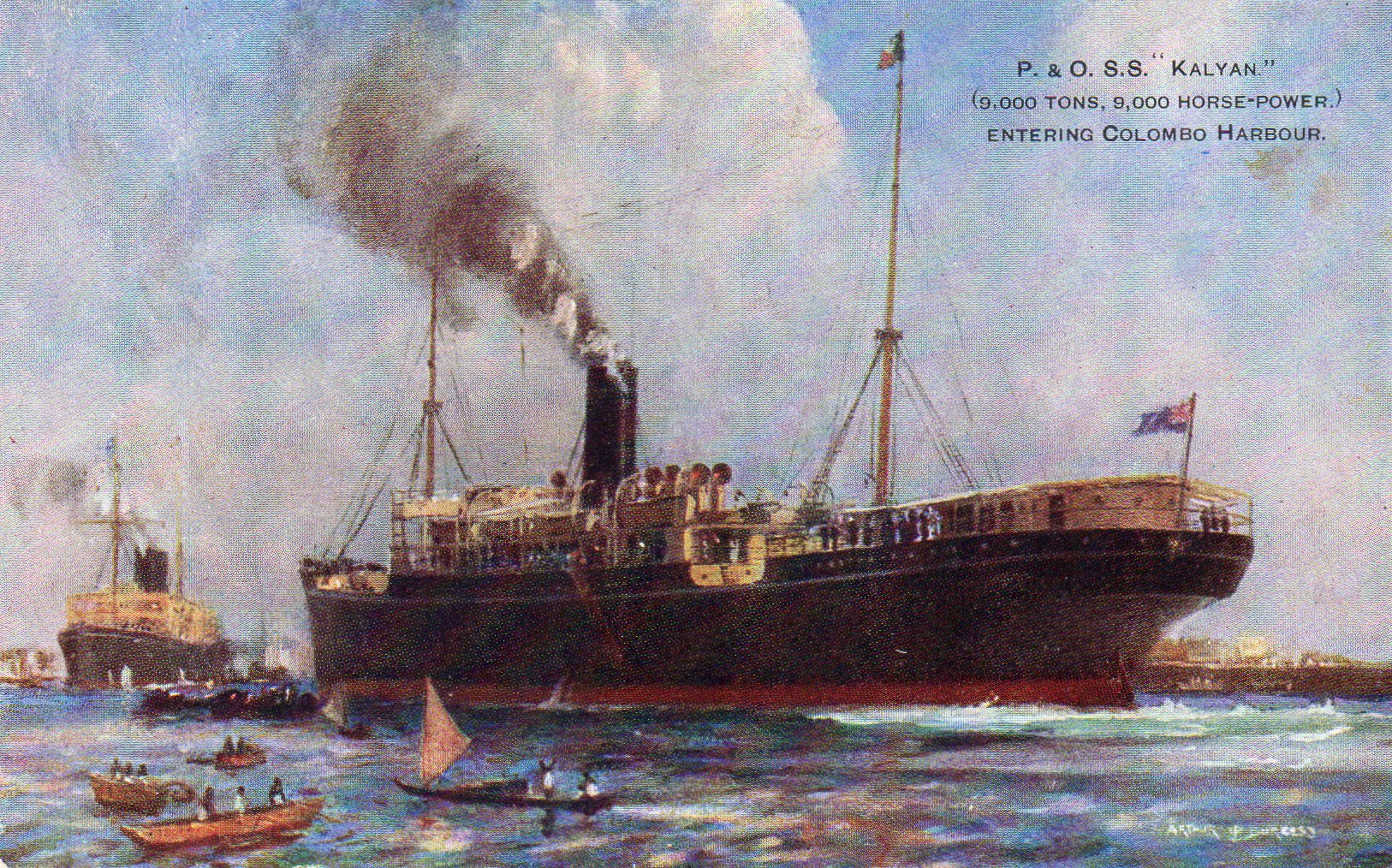
He lived first in Kobe, not moving up to Yokohama till 1929. There are a couple of letters which he wrote to his mother early in 1925 which are reproduced here. The second letter is particularly interesting as tells how Uncle Bill has started to learn Japanese and gives an account of his first Japanese dinner.
In December 1929 he sent a Christmas card to his uncle James MacDiarmid who lived in Oakleigh, Comrie, Perthshire. That card is postmarked from Yokohama and was sent via Siberia!
On 6 January 1930 he sent a picture postcard to James, also postmarked Yokohama. The picture is of "ice skating on the Lake Placid, Kanaya Hotel, Nikko". The card read "I got back last night from Nikko where I had been 5 days. This is a view of the pond behind the hotel where we skated. It is very pretty round about and a great place for temples."
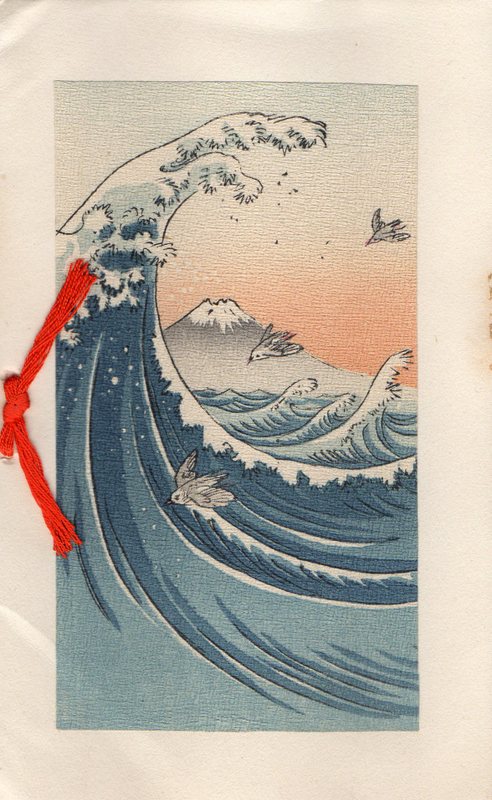
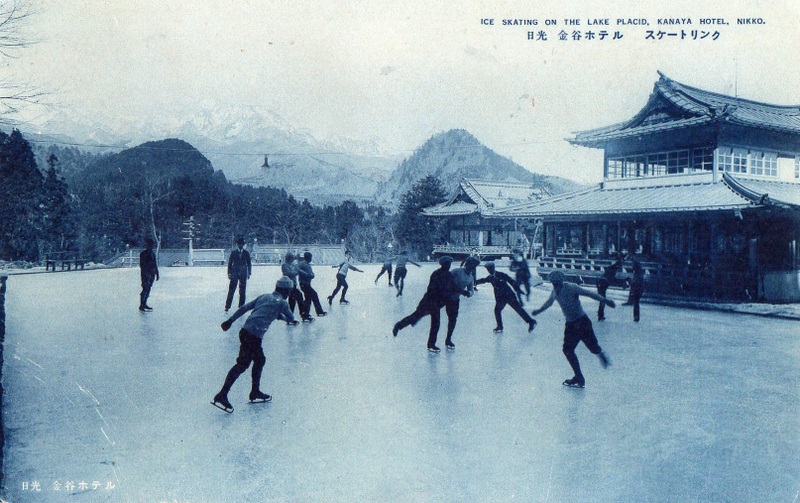
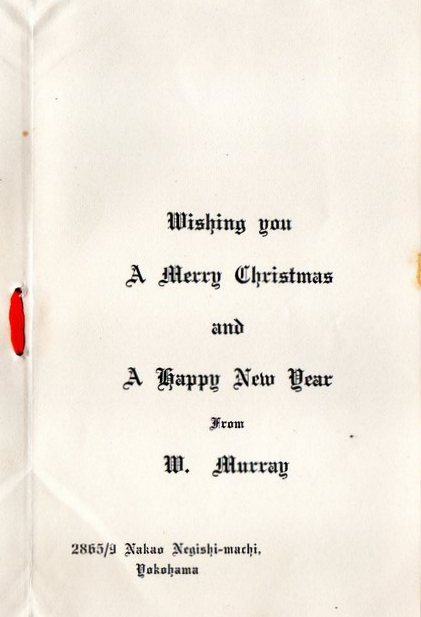
He also wrote on a different occasion of "being asked on a Thursday to fly to Mukden (in China) on the next Saturday to help take over the APC North China's assets in Manchuria" as the puppet government imposed there by Japan in 1931 (which the UK Government refused to recognise) had passed a Petroleum Industries Law in 1935.
At some point Uncle Bill must have joined Shell, because for several of the years he spent in Yokohama he worked for the Rising Sun Petroleum Company. I have discovered that a company called Shell Sekiyu KK was initially started in Yokohama in the early years of the Meiji era (around 1876) by the Samuel and Samuel Company, which was the fore-runner of the Shell Group. On 11 April 1900 Shell Sekiyu KK was incorporated as Rising Sun Petroleum Company and handled the import and sales of petroleum.
Probably some time in 1939 Bill became the Manager/Managing Director (?) of Rising Sun, on the retirement of his boss, Tom Ely. Apparently Tom, an American, was put in jail in Japan during the Second World War, and wasn't allowed out until 1944 in an exchange of prisoners of war. He then had to make his way back to the US. Sailing from Cape Town to New York he was well across the Atlantic when his ship was torpedoed and sunk. Tom was rescued after many hours alone in the dark. At dawn, as luck would have it, he discovered he was sitting on one of his own crates which contained his valuable collection of Japanese ivories and netsukes.
As for Bill, he was forced to flee Japan in 1941, following Japan's entry into the Second World War with the attack on Pearl Harbour - which triggered war in the Pacific.
As soon as he arrived home Bill went up to London to see if he could get a job with the Control Commission in Germany (CCG). They wanted him immediately. With his knowledge of so many languages - including German and Japanese - he would be most useful. He was posted to Minden in Westphalia and went at once. After a few months there he was asked if he would go to Berlin. By this time he had the army rank of Brigadier. He said he would go provided his wife, who had by that time joined him in Minden, could accompany him. The only accommodation they had available at the time was a garden flat in the Grunewald area which allegedly got flooded when it rained heavily. However, in all the time the Murrays were there it remained dry. Isabella describes the flat in her memoirs: "There were three rooms: a sitting room, dining room and bedroom. We both enjoyed having our meals in the large bare-floored dining room and watching the squirrels running about in the flower beds and burying the walnuts...... When we went shopping we had to go into town walking in the middle of the road to avoid being hit on the head by falling chimney pots and masonry. There was also a shortage of electricity. The families who had been allocated flats in the big newly built blocks had their water cut off from 9.00am to 6.00pm every day."
Then Uncle Bill was posted to Essen in the Ruhr, where he was chief of the finance staff. The CCG offices were in the Krupp mansion, the Villa Hűgel.
MARRIAGE
The years between the two World Wars were spent in Japan, where, on 8 October 1938 he married Isabella Inglis. It seems as though Bill and Isabella first met at a tennis party in Edinburgh in October 1937. They were evidently close neighbours. Bill's mother lived at 50 Fountainhall; and the Inglis family lived at number 56. Isabella (or Isabel as she was known) had recently returned home from a long trip to India and South Africa, and Bill was home on compassionate leave from the Far East to see his mother who was very ill. His visit must have done his mother a lot of good as she was soon back sitting in her upstairs drawing room bow window and waving to her neighbours. Having discovered they both shared an interest in golf, the Bill and Isabel used to play together with Isabel's brother Jamie and his wife on the Braids and at Dalmahoy until Bill had to return to Japan in November.
The following year Bill proposed to Isabel over the phone from Yokohama. She tells how, arriving home one afternoon, she found a message from the Post Office waiting for her asking her to get in touch. In those days a long distance call cost £5 a minute, so the Post Office had to get agreement from the recipient before the call was put through. Sure enough, it was Uncle Bill in Yokohama, asking her to marry him. Isabella had a double excitement - not only the propect of marriage, but also the long sea journey to Japan via Canada and Hawaii.
The wedding took place in Yokohama on 8 October 1938 and was reported in the following day's edition of The Japan Advertiser. The wedding ceremony was held at Christ Church and was performed by the Rev Thomas Powell Symonds, Chaplain of the Church, whilst the Right Rev Samuel S Heaslett, Bishop of South Tokyo, gave the blessing. Uncle Bill had had to go to Tokyo to see Bishop Heaslett and get permission for the marriage as neither he nor Isabel were members of the Church of England. And, in order to validate the marriage, a separate civil ceremony had to be carried out at the British Consulate. The bride was given away by Tom Ely, Bill's boss at Rising Sun.
In her memoirs Isabel writes of the wedding as follows:
"We were married on 8 October at 10.00am at the British Consulate by the Consul General over the Union Jack. Then Jane Austen, the Consul General, produced a bottle of champagne and toasted us. From there we went to our house in the Shell Compound (House Number 11) where we were again toasted by my bridesmaid and friends and neighbours. After that we separated and I went back to the Blyth's home (Joe and Nettie Blyth: Joe was the boss of Archie Shearer, Bill's best man) to rest and get ready for the wedding in Christ Church. The Minister was the Rev Tom Symonds, newly appointed to the charge of his first office. He married us and the Bishop of Tokyo came all the way from Tokyo to give us his blessing. He was a wonderful man.
The church was beautifully decorated with white flowers (chrysanthemums). Every pew had an arrangement in the umbrella stand and the apse had lots of flowers. Tom Ely, the number 1 in Bill's office acted for father and gave me away."
By the time of his marriage Bill had been connected with the Rising Sun Petroleum Company for many years and was evidently well known. Many members of the foreign communities of Yokohama and Tokyo and a number of prominent Japanese guests attended the wedding ceremony, the total guest list amounting to around 200.
Bill and Isabella's marriage and life together in Japan, followed by their separate journeys of escape after Japan's entry into the Second World War, are extraordinary sagas of faith and love, which culminated in their reunion in Cairo, where Bill had been given the responsibility of maintaining fuel supplies for Montgomery's 8th Army.
.....Click here for more details of the couple's World War II adventures.
RELIGION
Bill had a high sense of integrity and Christian stewardship. He was a life-long member of the Augustine Congregational Church in Edinburgh, and at some stage of his life he was the Treasurer there. He was nurtured in the life and work of Augustine Church through his family, his father, a highly respected figure himself, being a founding member of the church. Apparently when Bill went to Germany before the outbreak of the First World War to study at the University of Marburg, the only English book in his possession was the Bible.